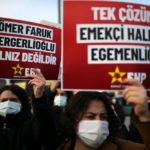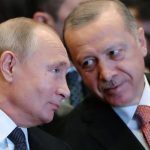A group of Uyghur women in Turkey started a march from İstanbul to Ankara on Wednesday demanding that the Turkish government help locate their children, whom they were forced to leave behind in China, the Duvar news website reported.
Most of the children reportedly had to be left behind as a result of China’s population policies, Duvar said. The protesting women said they needed the help of the Turkish government to locate their children and to navigate the Chinese bureaucracy. However, the ruling Justice and Development Party (AKP) has been reluctant to engage with China concerning the Uyghurs, because Turkey is dependent on Chinese investment and for a supply of COVID-19 vaccines.
China’s treatment of the Uyghurs has drawn international condemnation, with human rights groups estimating that some 1 million Uyghurs have been arbitrarily incarcerated in a network of prison camps. There have also been reports of forced sterilization, systematic torture and rape.
Uyghurs speak a Turkic language and have cultural ties with Turkey that make it a favored destination for avoiding persecution in China.
However, most Uyghurs who have fled to Turkey have had to leave all or some of their children behind. According to a statement by Human Rights Watch (HRW), millions of Uyghur families have been separated from each other. Children of detained Uyghur parents have been sent to state-run welfare institutions or boarding schools without their parents’ consent or access.
Now many families who have escaped China’s detention camps are looking to find and reunite with their children.
Speaking to Salih Gergerlioğlu of Duvar news website, Amine Muhammed Emin, a Uyghur woman in Turkey, said she had not heard from her children since 2016. She said she had to move to Turkey to avoid persecution after having five children, which is against China’s population policies.
She said she could not bring her children with her to Turkey because they were unable to obtain passports. Her husband had to return to China to take care of the left-behind children but was arrested for going to Turkey.
“Travelling to another country is enough reason for China to deem you a terrorist,” said Emin.
The United Nations Convention on the Rights of the Child, which China ratified in 1992, recognizes the family as the natural environment for the growth and well-being of children. The convention obligates governments to ensure that children should not be separated from their parents against their will, “except when competent authorities subject to judicial review determine, in accordance with applicable law and procedures, that such separation is necessary for the best interests of the child.” Such determinations may be necessary in cases involving parental abuse or neglect.
HRW said that even where abuse is concerned, removing children from the family should be the last resort and that children should be taken care of by relatives.
The Convention on the Rights of the Child provides that applications by children or their parents to enter or leave a country for family reunification must be dealt with in a “positive, humane, and expeditious manner.” According to HRW, such requests should have no adverse consequences for the applicants or their family members. Children whose parents reside in different countries have the right to maintain personal relations and direct contacts with both parents.
The UN High Commissioner for Human Rights, 25 countries, and many human rights groups, including Human Rights Watch have called on the Chinese government to allow independent observers unfettered access to Xinjiang to assess the scope and scale of abuses there.
Source: Stockholm Center for Freedom (SCF)



